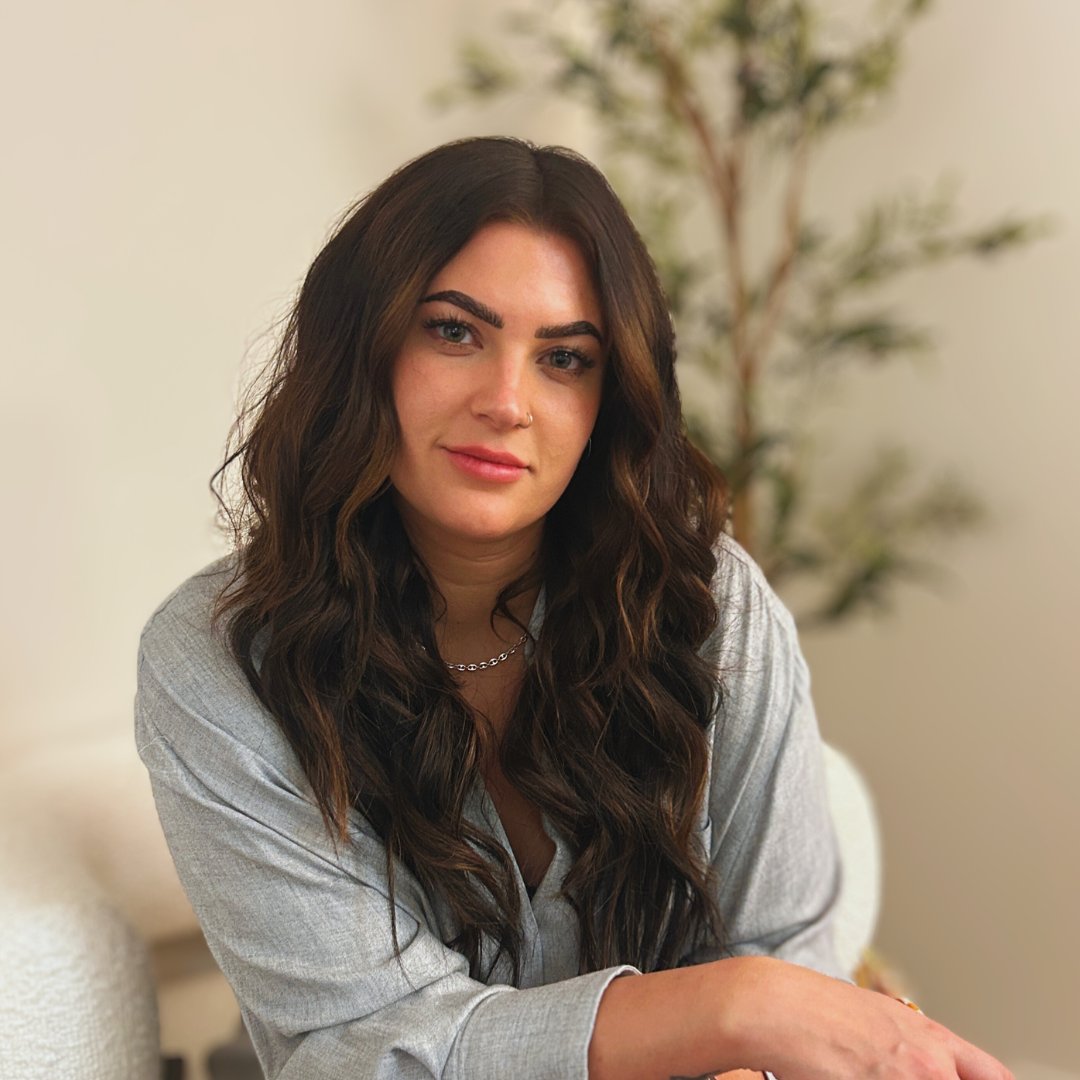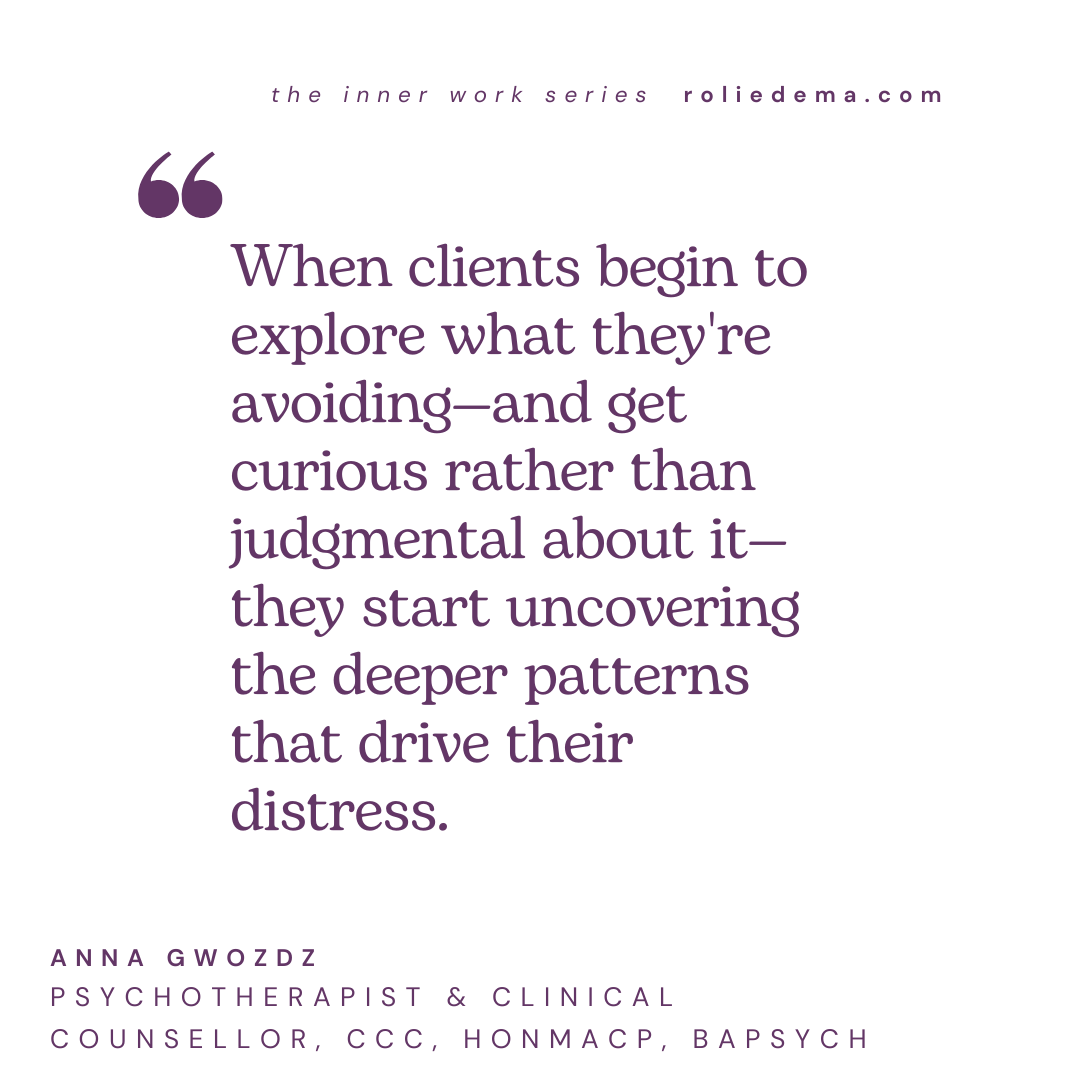- Home
- Think Pieces
- Interviews
- Inner Work Spotlight with Anna Gwozdz
Inner Work with Anna Gwozdz | Unlocking the Root of Avoidance
In this spotlight interview, therapist Anna Gwozdz reveals one way we unconsciously hide from discomfort and prevent real healing and growth in our lives.
Welcome to another edition of The Inner Work Series: What Therapists Want You to Know, a collection of short interviews that feature grounded wisdom from real therapists.
Today I'm honoured to feature Anna Gwozdz (Psychotherapist & Clinical Counsellor, CCC, HonMACP, BAPsych), Owner of/practicing at Bespoke Clinical Counselling in Calgary, AB.
Interview with Anna Gwozdz, Calgary Therapist

Q1. What’s one mindset shift you often help your clients make?
Many people come into therapy with deeply ingrained beliefs that they have to be hard on themselves to be motivated or successful.
They're often stuck in cycles of shame, perfectionism, or comparison, thinking they're not enough unless they're constantly achieving or pleasing others. I work with them to recognize that harsh inner dialogue is not only unhelpful—it's harmful.
Through our work, clients begin to understand that being kind to themselves doesn't mean giving up or making excuses.
It means acknowledging pain without judgment, speaking to themselves the way they would to someone they love, and recognizing that growth comes more easily from a place of safety and self-worth than from fear or punishment.
This shift toward self-compassion is powerful—it opens the door to deeper healing, resilience, and meaningful change.
Q2. What’s one small habit or daily action that helps with emotional resilience?
One small but powerful daily habit I often recommend for building emotional resilience is checking in with yourself each day—even for just a few minutes.
This can be as simple as pausing to ask yourself, "What am I feeling right now?" and "What might be contributing to this feeling?"
Doing this helps develop emotional awareness, which is foundational for resilience.
When you're more attuned to your internal state, you're better equipped to regulate emotions, respond thoughtfully rather than react impulsively, and recognize when you need support
Many clients find it helpful to pair this check-in with journaling, a mindfulness practice, or just taking a few slow breaths while reflecting.
Over time, this habit builds a stronger connection to your inner world, which increases your capacity to navigate stress, setbacks, and change with greater balance and clarity.
Q3. What’s one question you wish more people asked themselves (or their therapist)?
One question I wish more people asked themselves—or brought into therapy—is: "What am I avoiding and why?"
Avoidance is a common, often unconscious strategy we use to protect ourselves from discomfort—whether it's difficult emotions, painful memories, unmet needs, or uncomfortable truths about our relationships or behavior.
While it can provide short-term relief, avoidance often reinforces anxiety, keeps us stuck, and prevents real healing or growth.
When clients begin to explore what they're avoiding—and get curious rather than judgmental about it—they start uncovering the deeper patterns that drive their distress.
This question opens the door to meaningful insight, emotional processing, and ultimately, more freedom and choice in how they respond to life.
Q4. Recommend a favorite resource:
A favorite resource of mine is the podcast called Let's Talk About Mental Health by Jeremy Godwin.
The host is a counsellor, writer, and mental health advocate who does a great job of taking complex emotional issues and breaking them down into very simple and digestible concepts, while also providing concrete tools to apply in our lives to help better navigate these complex issues.
Most of the episodes are under 30 minutes and all of them are not only helpful, but entertaining, as well.
Q5. What’s one myth about therapy you’d love to bust?
One myth about therapy I'd love to bust is: "You need to be in crisis to go to therapy."
This belief keeps so many people from getting support until they're overwhelmed or burned out.
The truth is, therapy isn't just for crisis management—it's also a proactive space for growth, self-discovery, and learning healthier ways to navigate everyday life.
You don't have to wait until your world is falling apart to benefit. In fact, some of the most meaningful and lasting change happens when people come in curious, not in crisis.
Therapy can be a place to strengthen emotional resilience, improve relationships, clarify values, and understand patterns before they become bigger problems. Think of it as mental and emotional maintenance—not just emergency repair.
Find Anna Gwozdz
Enjoyed reading Anna's insights and answers to the above questions? Please visit Anna's website, bespokeclinicalcounselling.ca, and additional links below to connect with her and learn more about her work.
Anna's Links:
Thanks for reading! If you liked this content, share with a friend:
Recent Articles
-
5 Things to Stop Doing If You Want to Feel More Fulfilled
Feb 21, 26 05:35 PM
Are you unintentionally engaging in behaviours that leave you feeling depleted and empty? Here are 5 things to stop doing if you want to feel more fulfilled. -
5 Subtle Habits That Quietly Transform Your Life Over Time
Jan 25, 26 08:21 PM
Progress towards the things that matter isn't usually loud or dramatic. Here are 5 subtle habits that quietly transform your life over time. -
Inner Work with Marcus Lynn | How to Make Change More Realistic
Jan 19, 26 06:24 PM
In this spotlight interview, therapist Marcus Lynn explains how we can begin to see emotions as information and make change more realistic in our lives.









